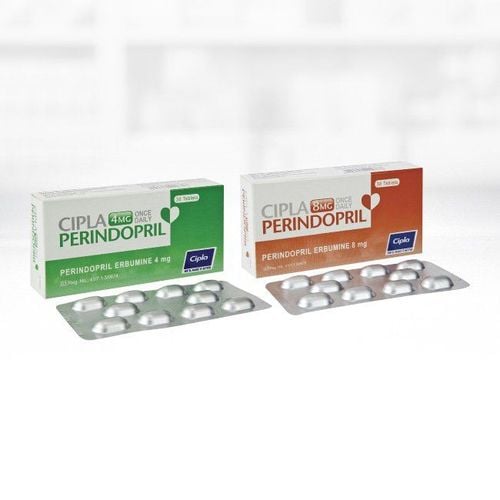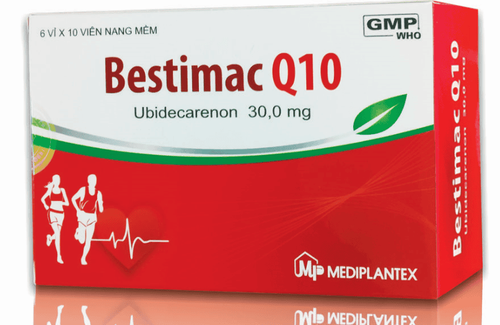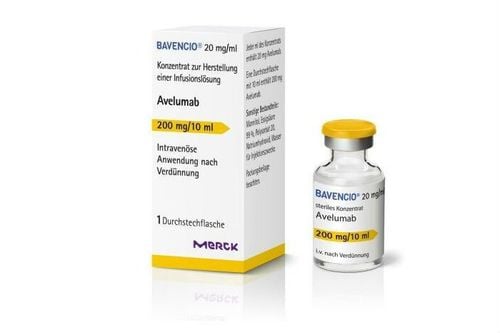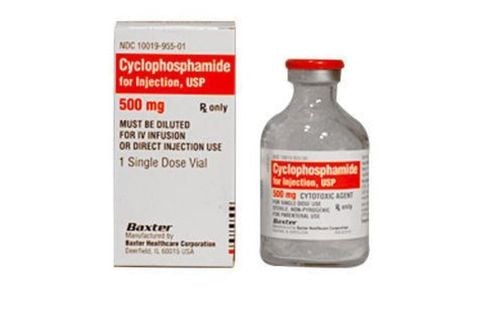This is an automatically translated article.
Mitomycin is a drug used to treat tumors through the mechanism of inhibiting DNA synthesis to cause cell death. The following article will introduce readers to the uses and some notes when using this drug.
1. What is Mitomycin?
Mitomycin is an anti-tumor antibiotic made from a soil fungus called Streptomyces caespitosus. Mitomycin inhibits DNA synthesis by creating DNA crosslinks that help prevent cell replication and eventually cause cell damage. This mechanism helps slow or stop the growth of cancer cells in the body because in general cancer cells divide faster and fix less errors than healthy cells, so they are more sensitive to this effect. .
2. How to use Mitomycin
Mitomycin is given by intravenous (IV) infusion. Dosage and duration of use will be determined by the size, type of cancer and the patient's condition. Alternatively, mitomycin is also available in gel form for direct insertion into the renal catheter.
The drug is blue in color and can make the patient's urine blue and usually lasts a day or two after each dose. If you experience other urinary tract symptoms, such as frequent or painful urination, contact your doctor immediately.
This medicine can cause burning sensation and pain and if it leaks out into the vein at the injection site it can lead to serious body tissue damage. If the injection area becomes red, swollen or painful at any time during or after the injection, notify the treating physician immediately.
3. Some possible side effects of the drug Mitomycin
Patients need to discuss carefully with their doctor about the side effects that Mitomycin can cause to have appropriate prevention. Some common side effects are as follows:
3.1. Infections due to low white blood cell counts Mitomycin can cause infections and lead to life-threatening infections due to low white blood cells.
White blood cells are cells that play a very important role in fighting infections. During drug treatment, the white blood cell count may drop, increasing the patient's risk of infection. Therefore, patients should notify their doctor immediately if they develop signs of fever with a temperature above 38 degrees Celsius, sore throat or cold, cough, difficulty breathing, burning when urinating, or pain that does not improve.
To prevent infection, you should take the following measures:
Wash your hands properly often several times a day. Avoid large crowds and people with colds, coughs, and fevers, or live with someone who has these symptoms. When working in direct contact with soil, wear protective clothing including long pants and gloves. Do not handle pet waste. Do not contaminate cuts or scrapes. Clean body. Do not trim cuticles or ingrown nails. Patients may paint their nails but do not apply artificial nail polish. Before performing dental procedures, it is necessary to consult a specialist. 3.2. Anemia due to low platelet count Your red blood cells are responsible for carrying oxygen to the tissues in your body. When the number of red blood cells is low, the patient will feel tired due to lack of oxygen to the tissues in the body. Therefore, during the use of the drug, if there are signs of shortness of breath or chest tightness, you should immediately notify your doctor.
3.3. Hemolytic uremic syndrome (HUS) This drug may also cause a rare syndrome called hemolytic uremic syndrome (HUS) that destroys red blood cells, damages blood vessels, and can lead to kidney failure . Notify your doctor right away if you experience unusual bruising or bleeding or notice a decrease in urine output.
3.4. Some of the less common side effects Lung problems: Some lung problems are rare during treatment or months to years later such as shortness of breath, cough without phlegm, fever, wheezing or wheezing. shortness of breath. Heart problems: Mitomycin can cause or worsen pre-existing heart problems including congestive heart failure, restrictive cardiomyopathy, decreased heart function, and heart attack. Tell your doctor right away if you experience sudden weight gain or swelling in your ankles or legs. If you experience symptoms of pain or tightness in your chest, pain in your left arm, back or jaw, sweating, difficulty breathing, rough skin, nausea, dizziness or lightheadedness, seek medical attention immediately. for prompt treatment. Reference source: oncolink.org
Please dial HOTLINE for more information or register for an appointment HERE. Download MyVinmec app to make appointments faster and to manage your bookings easily.













